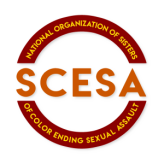Ellen Hong has a master’s degree in Divinity with a concentration in cross-cultural studies from Puller Theological Seminary. She has been with the Center for Pacific Asian Family (CPAF) since 2005 and currently serves as the Community Program Director. Prior to her work with CPAF, she has had extensive experience working with diverse populations in the United States and abroad. Her experience includes working with sexual assault victims in Taiwan, conducting HIV/AIDS awareness workshops in Uganda and assessing the healthcare needs of the homeless population in London. A passion of hers is advocating for healthy and safe communities for women and children, particularly within faith communities.
IN HER OWN WORDS
We asked our Sheroes some questions, here’s what Ellen had to say:
“Being a woman of color, it’s important that our communities and especially women and girls grow up feeling safe and confident in who they are.”
How did you come to be doing sexual assault work?
Prior to being at a rape crisis center I was immersed in the Asian Pacific Islander (API) community working with youth, faith communities, and homeless individuals/families. In every group, there were folks who had survived sexual assault and/or were at risk of sexual exploitation. That only exacerbated the challenges these populations already faced. It fueled my desire to take on one of the least talked about and severely under resourced issues. I wanted to see if addressing sexual assault head on would lift our communities. Since setting foot in the movement, I haven’t looked back.
Why do you think addressing sexual assault is important?
Being a woman of color, it’s important that our communities and especially women and girls grow up feeling safe and confident in who they are. Given the prevalence of sexual assault and the underreporting in API communities, I am committed to helping shed light on how this issue is affecting our community and working toward solutions with the community.
Why is it important for Communities of Color to address sexual assault in their community?
With the history of colonization both here and globally, the violence inflicted on bodies of color has long been normalized. As such, it would be naïve to think that this history of violence doesn’t affect our community’s psyche and sense of agency today when it comes to ending sexual violence. It’s not just important but imperative that we hold this historical context in mind when thinking through how our communities of color address sexual assault. Only then can we move from surviving to healing and from healing to rebuilding.
What are some of the lessons you have learned addressing sexual assault?
When working with immigrant/refugee communities to address sexual assault, I find that it’s critical to approach community with humility and ask what is working, rather than assuming that community is indifferent or unable to identify their own resources to address the issue. Many times, communities already have ideas and may just need additional support or resources to implement a solution. This is where our organization (CPAF) can offer resources and support the community in implementing their solutions or solutions that have been co-created.
How do you take care of yourself doing this work?
This work intersects with my Christian faith, which is at the core of who I am and what I am about. I regularly find myself in solitary meditation and prayer, but I also find the need to engage with my faith community to stay rooted in our calling as Christians to bring about justice, peace and affect the love of Christ in this world. Additionally, I spend lots of time with my family where there is always lots of laughter. Everyone is like an aspiring stand-up comedian—I can’t get the timing down right to try and squeeze in a crack because they are so darn fast and funny. But being with my extended family and especially with my husband and two girls is a regular part of my self-care.

